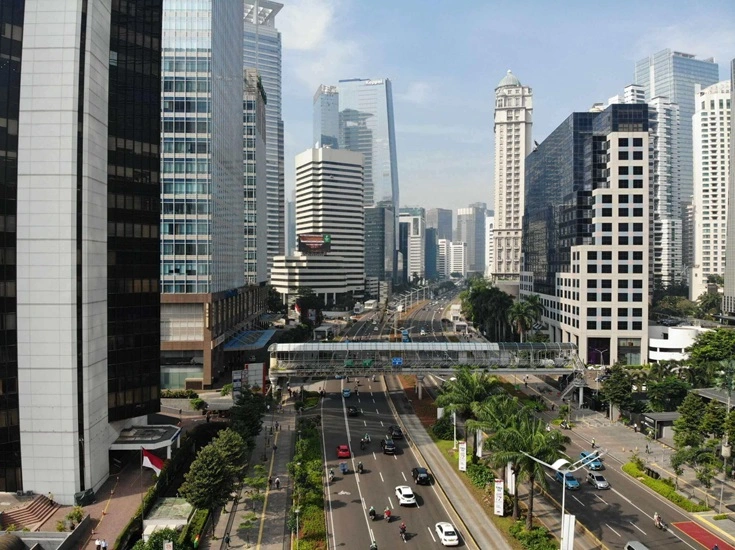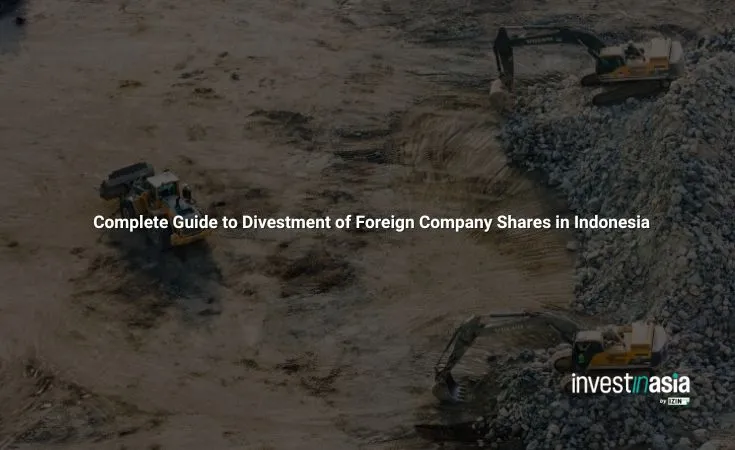Divestment rules in Indonesia define how foreign investors must transfer shares to Indonesian participants, especially in regulated industries like mining. The framework combines resource nationalism with policies to maintain foreign investor confidence. Understanding these requirements is crucial for structuring long-term investments, maintaining compliance, and safeguarding capital.
Regulatory Framework


Indonesia’s divestment rules are anchored in BKPM Regulation No. 4 of 2021 and sector-specific regulations. The mining industry remains the strictest, while most non-mining PT PMA companies are no longer subject to mandatory divestment.
Mining Sector Divestment
Foreign-owned mining companies must divest 51% ownership to Indonesian parties, following a staged timeline starting in the 6th year of production. For underground mining operations with refining facilities, divestment begins in the 20th year under Government Regulation No. 96/2021.
Divestment Timeline:
- 6th year of production: Minimum 20% divestment
- 7th year: 30% divestment
- 8th year: 37% divestment
- 9th year: 44% divestment
- 10th year: 51% divestment
The priority of buyers is clearly defined:
- Central Government
- Regional Governments
- State-Owned Enterprises (BUMN) and Regional-Owned Enterprises (BUMD)
- Private Indonesian entities
If no buyer emerges, shares may be listed on the Indonesia Stock Exchange.
Also read: Mining Industry in Indonesia: Outlook and Potential
General PT PMA Companies
For most non-mining PT PMA companies, divestment requirements have been lifted since 2013. Only firms with pre-existing obligations must comply. Exemptions also apply if no Indonesian shareholders demand divestment or if no agreement exists with local parties.
Also read: Does a PT PMA Company Need Indonesian Shareholders and Employees?
Share Valuation Rules
Divestment pricing is based on Fair Market Value (FMV), often calculated through discounted cash flow, market data comparisons, or independent appraisal. Negotiations between the government and investors must be concluded within 90 days, though valuation disputes are common.
Sector-Specific Variations
| Sector | Divestment Required | Timeline | Indonesian Participants Priority | Current Status | |
| Mining (General) | Yes – 51% | 5th-10th year of production | Central Gov → Local Gov → SOE/ROE → Private | Active enforcement | |
| Mining (Underground with Integrated Processing) | Yes – 51% | 20th year of production | Central Gov → Local Gov → SOE/ROE → Private | Modified timeline (GR 96/2021) | |
| Oil & Gas | Varies by contract | Contract specific | Contract specific | Contract dependent | |
| General PT PMA | Generally No | Only if specified in old licenses | Indonesian citizens or entities | Exemptions available under BKMP 4/2021 | |
| Telecommunications | Varies by sub-sector | Sector specific | Sector specific | Sector regulations apply | |
| Financial Services | Varies by type | License specific | License specific | Banking/Insurance specific rules | |
| Tourism & Hospitality | Generally No | N/A | N/A | Open to foreign investment | |
| Manufacturing | Generally No | N/A | N/A | Open to foreign investment | |
Also read: Top Foreign Investment Sectors in Indonesia
Enforcement and Compliance Risks


As reported on the official website of Indonesian Immigration, “Operation Wira Waspada” in January 2025 resulted in 267 foreign companies losing licenses due to non-compliance. Authorities now integrate monitoring between BKPM and immigration systems. This underscores the importance of strict adherence to reporting, capital, and licensing requirements.
Also read: What Happens If You Operate a Business in Indonesia Without a Proper License?
Implications for Foreign Investors
- Sector Choice: Select industries without divestment mandates to maintain control.
- Ownership Planning: Expect gradual dilution in mining ventures.
- Partnerships: Structuring joint ventures early can mitigate divestment risks.
- Legal Compliance: Ensure all agreements are documented and approved by the Ministry of Law and Human Rights. Avoid nominee arrangements.
Also read: 10 Challenges of Doing Business in Indonesia
How InvestinAsia Helps
Navigating Indonesia’s divestment landscape requires expertise in licensing, compliance, and shareholding structures. InvestinAsia’s Indonesia PMA Company Registration Service provides complete assistance with incorporation, structuring, and regulatory compliance.
This ensures that foreign investors can enter Indonesia’s market with confidence while aligning with divestment and capital rules.
You can also enjoy special package prices for PT PMA and KITAS services.
Ready to start your business and investment in Indonesia? Chat with us now for FREE consultation!
FAQs
Is divestment mandatory for all foreign companies in Indonesia?
No. Only mining and certain regulated industries face strict divestment obligations. Most PT PMA companies established after 2013 have no such requirement.
When must mining companies divest shares?
They must start by the 6th year of production and reach 51% by the 10th year. Exceptions exist for underground operations, which start divestment in the 20th year.
How is divestment pricing calculated?
Prices are determined by Fair Market Value using cash flow projections, market data, or independent appraisal.
What happens if a company fails to comply?
Non-compliance may lead to license revocation, as seen in 2025 when hundreds of companies lost operating rights.
Can foreign investors use nominee arrangements?
No. Nominee structures are prohibited and may invalidate shareholding agreements.




